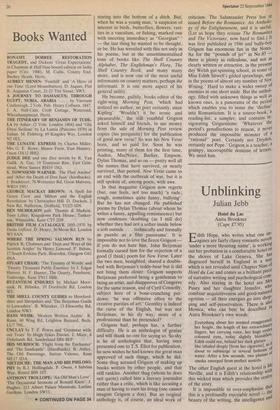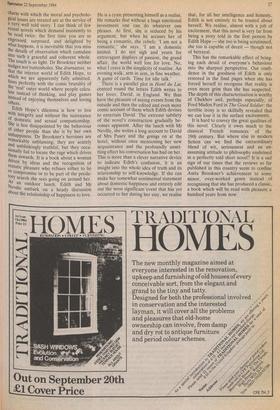Unblinking
Julian Jebb
Hotel du Lac Anita Brookner (Cape £7.95)
dith Hope, who writes what one nu' Lagines are fairly classy romantic novels 'under a more thrusting name', is working out her probation in a comfortable hotel on the shores of Lake Geneva. She has disgraced herself in England in a WaY, which is not revealed until Chapter Nine 01 Hotel du Lac and comes as a brilliant piece of narrative writing and psychological com- edy. Also staying in the hotel are Mrs Pusey and her daughter Jennifer, vih°, combine acquisitiveness and good-natured egotism — all their energies go into shoe' ping and self-preservation. There is als° Monica, who can best be described in Anita Brookner's own words: Everything about her seemed exaggerated: her height, the length of her extraordinary fingers, her carrying voice, her huge oyster coloured eyes, today slightly bloodshot, Edith could see, behind her dark glasses • She inhaled deeply [from her cigarette), as if about to submerge in several fathoms of' water. After a few seconds, two plumes smoke emerged from perfect nostrils.
The other English guest at the hotel is Mr Neville, and it is Edith's relationship With this wicked man which provides the centre of the story. It is impossible to over-emphasise that this is a profoundly enjoyable novel — the beauty of the writing, the intelligence and
charm with which the moral and psycholo- gical issues are treated are at the service of a very well told story. I can think of few recent novels which demand insistently to be read twice; the first time you are so engrossed, surprised, and delighted by what happens, it is inevitable that you miss the details of observation which cumulate into such a graceful and coherent whole. The touch is so light. Dr Brookner neither nudges nor buttonholes. She dramatises, so that the interior world of Edith Hope, to which we are apparently fully admitted, fuses perfectly with the comic brutality of the 'real' outer world where people calcu- late instead of thinking, and play games Instead of enjoying themselves and loving others.
Edith Hope's dilemma is how to live with integrity and without the sustenance of domestic and sexual companionship. She is less disappointed by the behaviour of other people than she is by her own unhappiness. Dr Brookner's heroines are remarkably unblaming; they are acutely and unblinkingly truthful, but they occa- sionally fail to locate the rage which drives them inwards. It is a book about a woman driven by ideas and the recognition of ecstatic pleasure who refuses either to lie Or compromise or to be part of the preda- tory search she sees going on around her. At an outdoor lunch, Edith and Mr Neville embark on a heady discussion about the relationship of happiness to love.
He is a cynic presenting himself as a realist. He remarks that without a huge emotional investment one can do whatever one pleases. At first, she is seduced by his argument, but when he accuses her of being a romantic, she rebels: 'I am not a romantic,' she says. 'I am a domestic animal. I do not sigh and yearn for extravagant displays of passion, the grand affair, the world well lost for love. No, what I crave is the simplicity of routine. An evening walk, arm in arm, in fine weather. A game of cards. Time for idle talk.'
There is a parallel plot in Hotel du Lac centred round the letters Edith writes to her lover, David, in England. We thus have the pleasure of seeing events from the outside and then the edited and even more comic account of them which Edith devises to entertain David. The extreme subtlety of the novel's construction gradually be- comes apparent. After the lunch with Mr Neville, she writes a long account to David of Mrs Pusey and the goings on at the hotel, without once mentioning her new acquaintance and the profoundly unset- tling effect his conversation has had on her. This is more than a clever narrative device to indicate Edith's confusion, it is an insight into the whole idea of truth and its relationship to self-knowledge. If she can make her somewhat sentimental statement about domestic happiness and entirely edit out the most significant event that has yet occurred to her during her stay, we realise that, for all her intelligence and honesty, Edith is not entirely to be trusted about herself. We realise, almost with a jolt of excitement, that this novel is very far from being a story told in the first person by Edith Hope — she too is being scrutinised, she too is capable of deceit — though not of betrayal.
This has the remarkable effect of bring- ing each detail of everyone's behaviour into the sharpest perspective. Our confi- dence in the goodness of Edith is only restored in the final pages when she has forced herself to recognise that reality is even more grim than she has suspected. The depth of this characterisation is worthy of Chekhov and, perhaps especially, of Ford Madox Ford in The Good Soldier: the terrible irony is so skilfully revealed that we can lose it in the surface excitements.
It is hard to convey the great qualities of this novel. Clearly it owes much to the classical French romances of the 19th century. But where else in modern fiction can we find the extraordinary blend of wit, seriousness and an un- assuming attitude to philosophy enshrined in a perfectly told short novel? It is a sad sign of our times that the reviews so far published in this country seem to confine Anita Brookner's achievement to some minor, over-worked genre instead of recognising that she has produced a classic, a book which will be read with pleasure a hundred years from now.











































 Previous page
Previous page